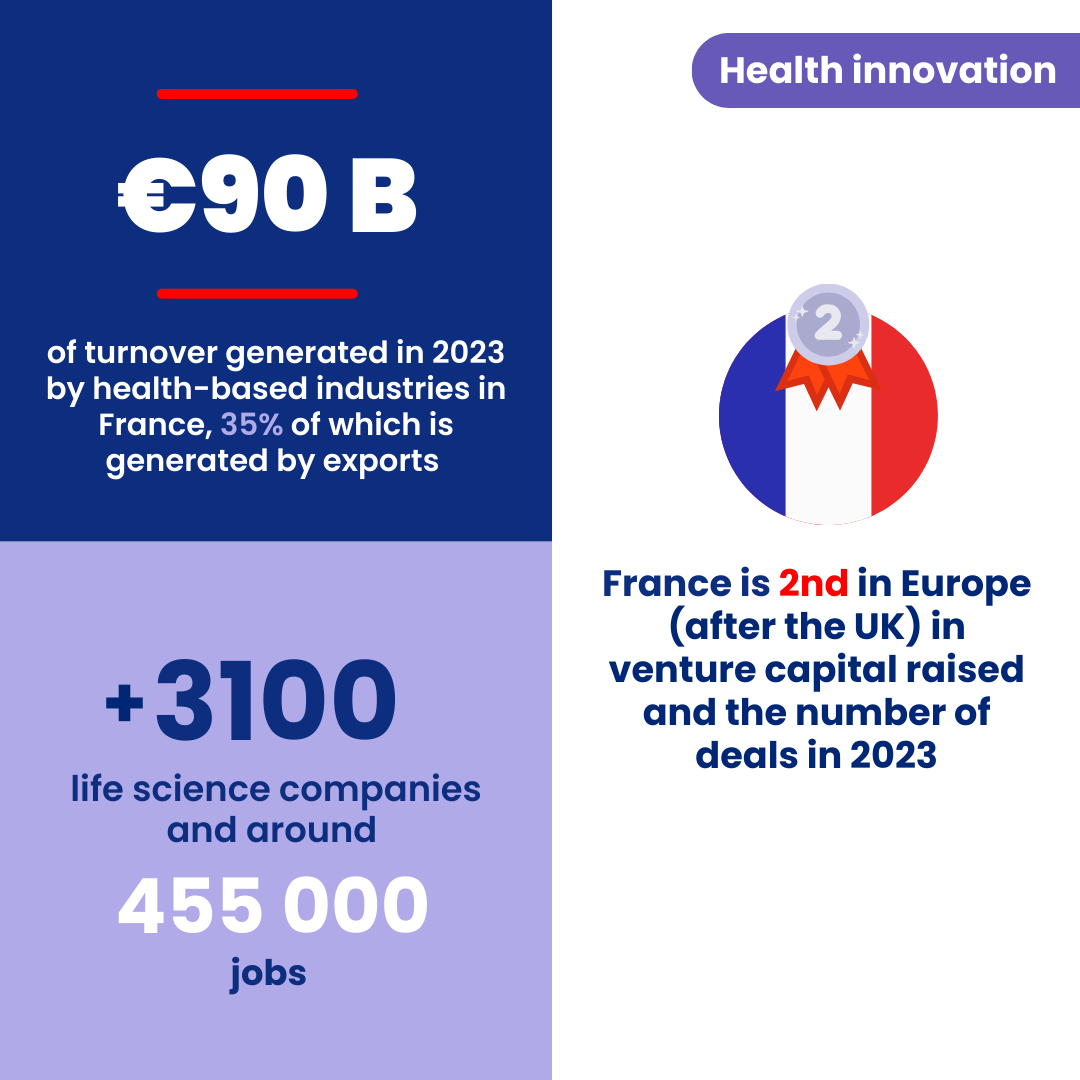France – a leading country in health innovation

An innovative ecosystem which is exported around the world
The health sector is a pillar of the French economy. In 2023, health-focused industries achieved a turnover of 90 billion euros, 35% of which was built around exports (Source: Snitem). France is home to several leading global players within the health sector, in fields such as pharmacy, biotechnology and medical equipment, such as Sanofi, Ipsen, Servier, BioMérieux etc.
Also home to over 2,600 innovative companies in the medtech, biotech and digital solutions sectors, the country boasts an extremely dynamic and innovative ecosystem. In 2023, digital health start-ups in France raised almost 1.8 billion euros in funds – proof of the demand for technologies capable of improving health care. These companies are not merely content to transform health care, they also generate highly qualified jobs and stimulate the economy, in so doing positioning France among the world leaders in health innovation (Source: Panorama France HealthTech 2023).
“Healthtech companies in France contribute to our healthcare sovereignty and to the reindustrialisation of the country” - Roland Lescure, former minister for Industry and Energy.
France is also recognised the world over for the quality of its research centres, such as the Institut Pasteur, a key player in biomedical research on an international scale. Lastly, the country’s health bio-clusters, such as Paris-Saclay and Lyon Biopôle, enhance France’s visibility internationally, attracting investors and talents within a competitive and innovative ecosystem. Bringing together companies, laboratories and institutions to fast-forward biomedical innovation, they play a key role facilitating collaborative research, the development of new therapies, and the industrialisation of cutting-edge technologies.

Unwavering state-funded support
State-funded support for companies and research institutes in the health sector is essential to stimulate medical innovation. As a result, the 2030 Health Innovation Plan, representing the health aspect of the France 2030 investment plan, illustrates France’s strong ambitions in terms of innovation in the health sectors, with a budget of 7.5 billion euros. The research tax credit (CIR) and the innovation tax credit (CII) are extremely attractive mechanisms for innovative health-based companies as they enable a reduction in development costs for innovative products and processes.
The French Healthcare label is another major initiative launched by the Ministry for Europe and Foreign Affairs in 2018. The aim of this combined public-private initiative is to bring together players in the health sector1 in order to promote, collectively, their innovations, expertise and technologies internationally. Its objectives include the promotion of France health ecosystems overseas, the development of commercial, medical and scientific partnerships, as well as the co-creation of innovative solutions.
1 Companies, healthcare establishments, research institutes, innovation clusters, scientists, health industrialists and professionals, etc
Cities at the cutting-edge of health innovation
The capital of health innovation, Paris is home to renowned research centres (Institut Pasteur, Inserm), numerous start-ups in the digital health and biotech fields, the Medicen innovation hub, as well as university hospitals renowned for their excellence, such as AP-HP.
The beating heart of health innovation, the French capital hosts numerous international trade shows such as SantExpo (formerly known as Paris Healthcare Week), HealthTech Innovation Days, and PharmagoraPlus, the latter focused towards professionals in the pharmacy sector.
Cities such as Lyon, Marseille, Toulouse, Bordeaux and Lille, as well as Strasbourg and Nice, also stand out for their dynamism in the health and innovation sectors. These cities combine a cutting-edge infrastructure, collaborative research and entrepreneurial ecosystems in order to consolidate France’s position as a world leader in health innovation.

1. Lyon is a key cluster for biotechnologies and life sciences, thanks to institutions such as the Lyonbiopôle, which brings together companies and scientists, and has strong expertise in immunology and vaccines.
2. Marseille stands out for the Marseille Cancer Research Centre (CRCM), specialising in cancer and immunology research. The city is also home to Eurobiomed, the competitiveness cluster dedicated to healthtech.
3. Toulouse is a key player in the development of connected health technologies and innovative health equipment thanks to its expertise in artificial intelligence and medical robotics.
4. Lille is a also a key player in France’s health ecosystem thanks to the NSL cluster (New Health Solutions), which brings together companies, laboratories and institutions specialising in health technologies. This cluster stimulates innovation and collaborative research, placing Lille as a centre of excellence for the development of advanced medical solutions.
5. Nice plays a central role in France’s health ecosystem thanks to the city’s Centre Hospitalier Universitaire (CHU) and the Antoine Lacassagne Cancer Centre. In addition, the 3IA Côte d’Azur network is an Interdisciplinary Institute for Artificial Intelligence dedicated to advanced research in digital health and digital biology.
6. Strasbourg is a hub for biomedical research and robot-assisted surgery, thanks to institutions such as the world-renowned Institut de Chirurgie Guidée par l’Image (IHU Strasbourg). Lastly, the Biovalley competitiveness cluster is a key hub for France’s health ecosystem, bringing together companies, scientists and institutions specialising in biotechnologies.
7. Bordeaux also plays a strategic role in France’s health ecosystem thanks to the TIC Santé cluster, with its array of companies, scientists and specialist institutions. This cluster encourages collaborative innovation which enables the development of advanced digital solutions to improve healthcare and medical research.



